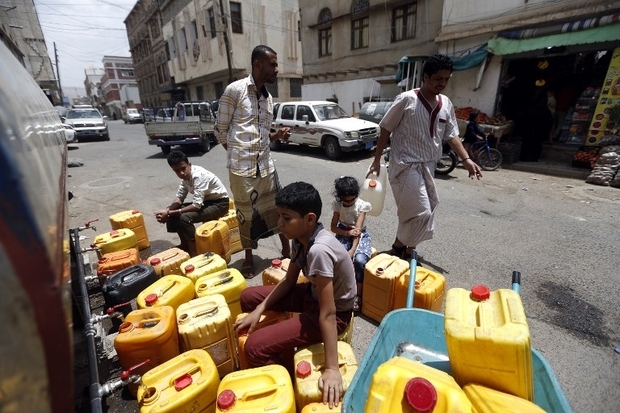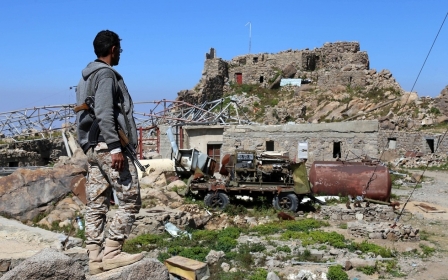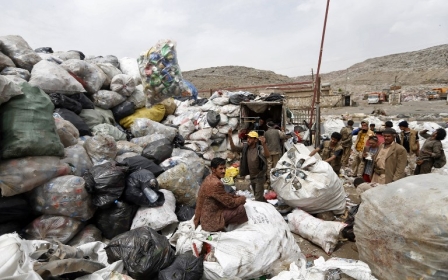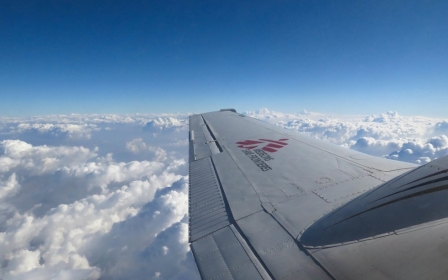Three UN agencies urge Saudi-led coalition to lift Yemen blockade

The heads of three UN agencies urged the Saudi-led military coalition on Thursday to lift its blockade of Yemen, warning that "untold thousands" will die if it stays in place.
Seven million people in Yemen are already facing famine, but without the reopening of its ports that number could increase by 3.2 million, the heads of the World Food Programme, Unicef and the World Health Organisation said in a joint statement.
"The cost of this blockade is being measured in the number of lives that are lost," the statement from David Beasley, Anthony Lake and Tedros Adhanom Ghebreyesus said.
"Together, we issue another urgent appeal for the coalition to permit entry of lifesaving supplies to Yemen in response to what is now the worst humanitarian crisis in the world."
UN Secretary-General Antonio Guterres wrote to Saudi UN ambassador Abdallah al-Mouallimi to warn him that the blockade was "already reversing the impact of humanitarian efforts", UN spokesman Stephane Dujarric said on Thursday.
"The secretary-general is very much disappointed we've not seen a lifting of the blockade. The secretary-general and his humanitarian team are heartbroken at the scenes we're seeing from Yemen," Dujarric told reporters.
The secretary-general is very much disappointed we've not seen a lifting of the blockade
- Stephane Dujarric, UN spokesman
The coalition closed all air, land and sea access to Yemen on 6 November after the interception of a missile fired towards the Saudi capital, saying it had to stem the flow of arms from Iran to its Houthi opponents in the war in Yemen.
Saudi Arabia has since said that aid can go through "liberated ports", but not Houthi-controlled Hudaidah, the conduit for the vast bulk of imports into Yemen.
For months, the UN has warned that the closure of Hudaidah would dramatically escalate the crisis.
As of Wednesday, 29 vessels, with 300,000 tonnes of food and 192,000 tonnes of fuel, had been blocked, while UN ships carrying $10m worth of health and nutrition supplies and 25,000 tonnes of wheat were waiting to berth at Hodeidah, according to another UN statement.
"Without fuel, the vaccine cold chain, water supply systems and waste water treatment plants will stop functioning. And without food and safe water, the threat of famine grows by the day," the UN agency heads said.
At least one million children are at risk if a fast-spreading diphtheria outbreak is not stopped in its tracks, and the lives of 400,000 pregnant women and their babies are under threat because of the lack of medicines.
The UN has listed Yemen as the world's number one humanitarian crisis, with 17 million people in need of food, seven million of whom are at risk of famine.
Yemen is also battling one of the world's worst outbreaks of cholera that has left nearly one million people ill and killed 2,200 people.
The number of new cholera cases has declined for the last eight weeks, Sherin Varkey, Unicef deputy representative in Yemen, said in a telephone interview from Sanaa on Thursday.
The government-controlled port of Aden has reopened and Sanaa airport is operating for commercial flights, but this was inadequate as "needs are so huge", he said.
"There is a fuel crisis. Some estimates say fuel will only last in the country for 20 days because of the blockade and challenges of getting fuel into the country," Varkey said. UNICEF is helping provide clean water to six million Yemenis by ensuring fuel is delivered to water pumping stations in cities, he said.
"Our worry is with the fuel shortage - this could affect and even, we assume, reverse the declining trend [in cholera]," he said.
New MEE newsletter: Jerusalem Dispatch
Sign up to get the latest insights and analysis on Israel-Palestine, alongside Turkey Unpacked and other MEE newsletters
Middle East Eye delivers independent and unrivalled coverage and analysis of the Middle East, North Africa and beyond. To learn more about republishing this content and the associated fees, please fill out this form. More about MEE can be found here.




